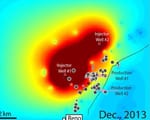Motion capture software, popular in the world of video gaming, is being tested to see if it may be a useful tool in the classroom.
Researchers know that the more engaged students are, the more likely they are to learn.
In her research, SMU teaching expert Candace Walkington, assistant professor of teaching and learning in SMU’s Annette Caldwell Simmons School of Education & Human Development, has measured different kinds of engagement and its effectiveness as a teaching tool.
Now Walkington has asked students to test motion capture software as a tool for teaching math. The students are enrolled in summer video game design camps at Guildhall, SMU’s premier graduate video game education program.
Students practiced a motion capture software program that teaches geometry. The program was created by Walkington in partnership with Extreme Reality, an industry leader in motion capture software. Results of the preliminary testing will be included in a grant proposal Walkington is preparing to test the software further.





For the preliminary test, Walkington asked students to read problems on a computer and then move their arms to either signal their answers or advance the math questions to the next sequence.
The study is one of several for Walkington, whose previous studies have focused on how abstract mathematical concepts can be grounded in students’ out-of-school interests, experiences and everyday reasoning practices.
Another of Walkington’s recent studies, published in the Journal of Educational Psychology, draws data from Pennsylvania classrooms using an in-school intelligent tutoring system for Algebra I. The software personalizes instruction to match the pace of each student, detects a student’s current state of knowledge, determines which kinds of problems to present and what feedback and help are needed, and tracks each child’s progress. Walkington has a long-time collaboration with Carnegie Mellon University’s Pittsburgh Science of Learning Center.
She has also been awarded a grant as part of the Spencer Postdoctoral Fellowship Program of the National Academy of Education. The $55,000 grant supports early career scholars working in critical areas of education research.
Walkington earned B.S. and M.S. degrees in mathematics from Texas A&M University, and had planned to have a career as a financial mathematician. She changed her career path after completing a National Science Foundation graduate teaching fellowship at a high-poverty rural school in Iola, Texas.
There Walkington discovered firsthand the satisfaction of designing innovative strategies to help struggling fifth and sixth graders learn math. The experience brought back memories of her own seventh-grade struggle with algebra, which had threatened to derail her interest in math.
Walkington has also participated in the Measures of Effective Teaching Project, funded by the Bill & Melinda Gates Foundation.
While working on her Ph.D. at the University of Texas at Austin, Walkington collaborated on research geared toward identifying what teacher behaviors are a strong predictor of student success on standardized math tests. The research was incorporated into the Gates Foundation’s Measures of Effective Teaching Project, one of the largest research efforts in U.S. history to identify and understand effective teaching. The project is shaping educational policy nationally.
Walkington and research colleague Michael P. Marder, executive director of UTeach Science Program, University of Texas at Austin, contributed protocols to the MET Project based on their findings, including one finding that classrooms where the teacher focuses specifically on students deeply understanding math have higher test scores compared to classrooms where teachers focus on drill and standardized test preparation. In addition, they also found that classroom management was a necessary, but not sufficient, condition for learning.
Walkington’s research appears in a new groundbreaking book about the MET Project, “Designing Teacher Evaluation Systems: New Guidance from the Measures of Effective Teaching Project,” (Wiley, July 2014). Walkington, who led a team that analyzed 1,000 video math lessons of teachers around the country to code effective teaching, is first author on a chapter. — Margaret Allen
Follow SMUResearch.com on twitter at @smuresearch.
SMU is a nationally ranked private university in Dallas founded 100 years ago. Today, SMU enrolls nearly 11,000 students who benefit from the academic opportunities and international reach of seven degree-granting schools. For more information see www.smu.edu.

 Physicists tune Large Hadron Collider to find “sweet spot” in high-energy proton smasher
Physicists tune Large Hadron Collider to find “sweet spot” in high-energy proton smasher